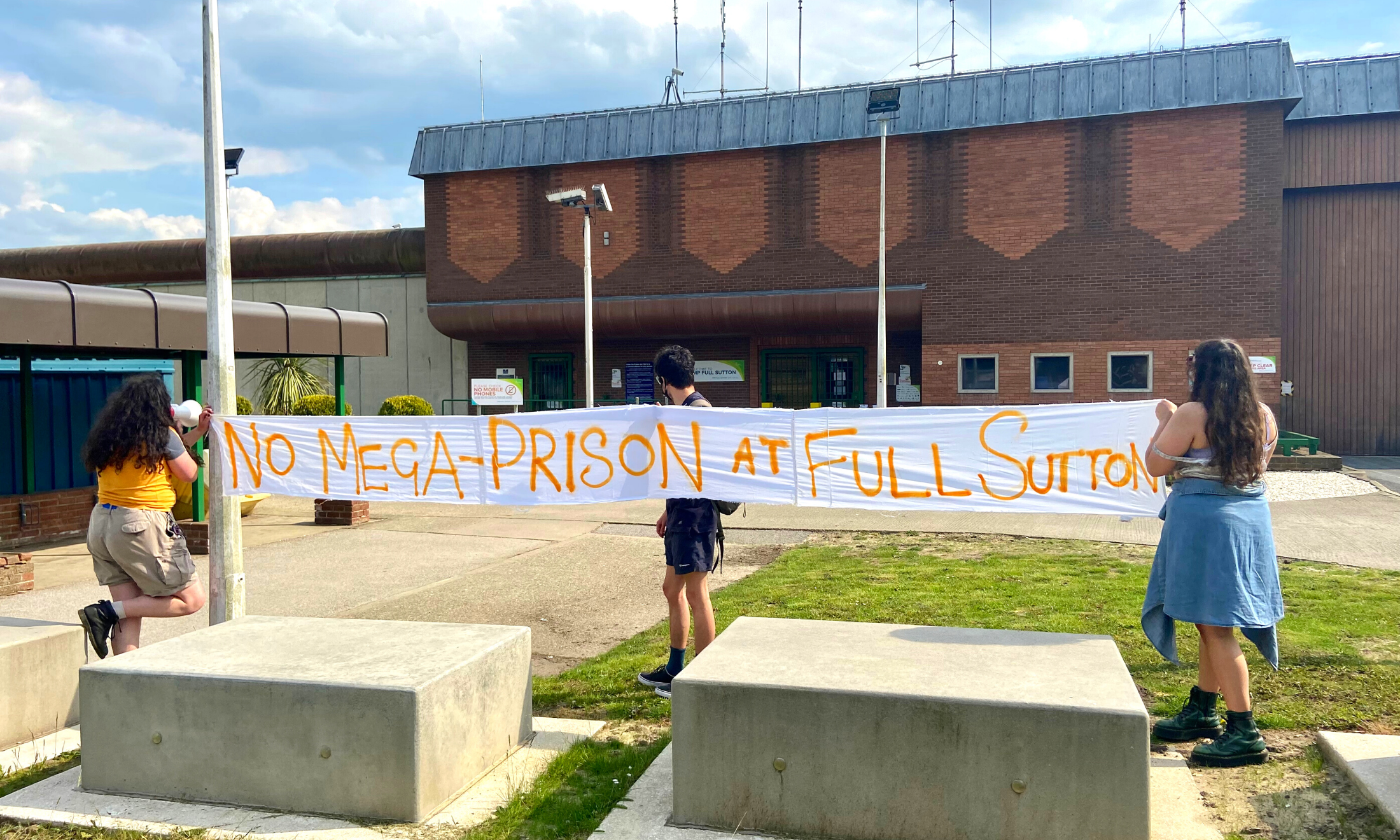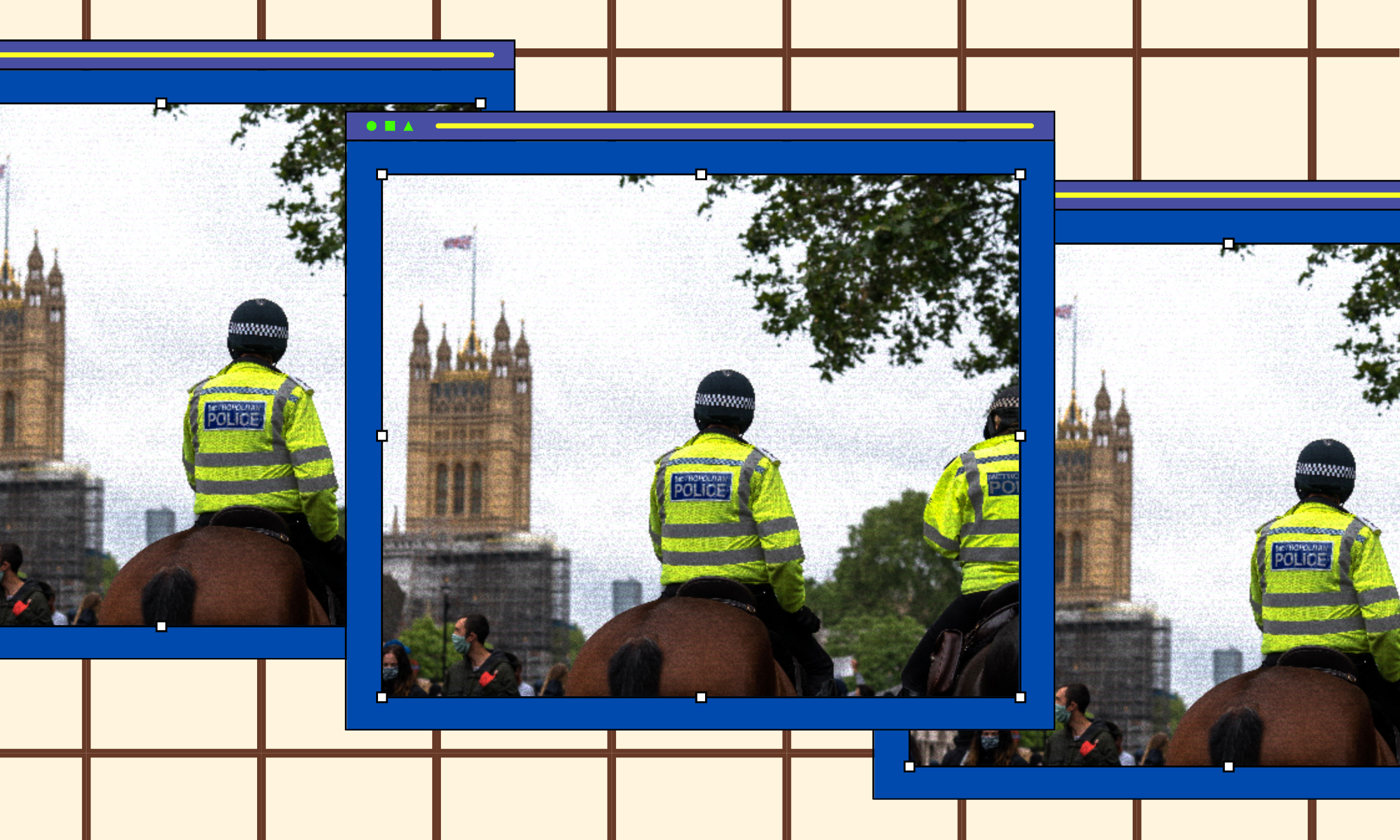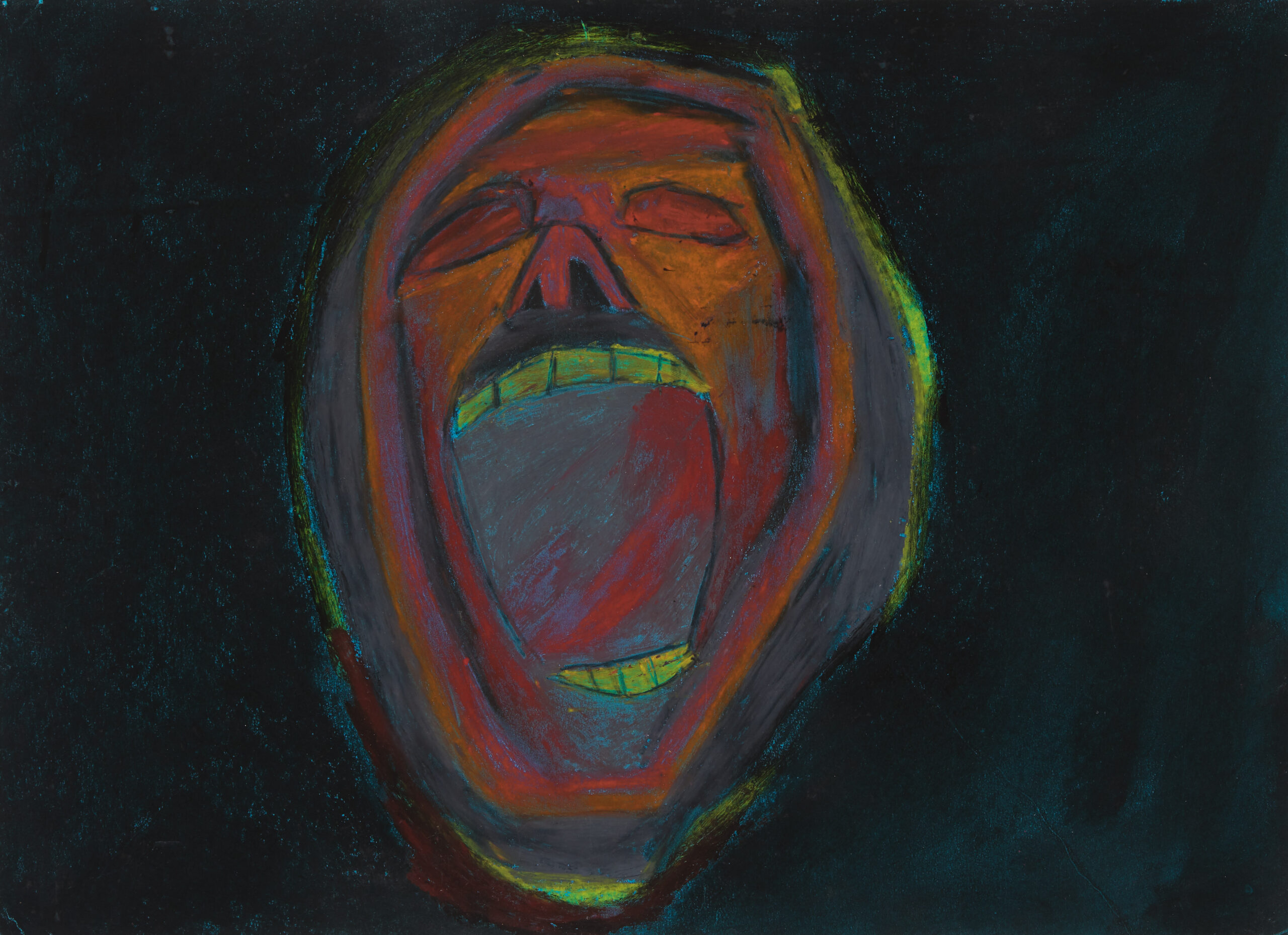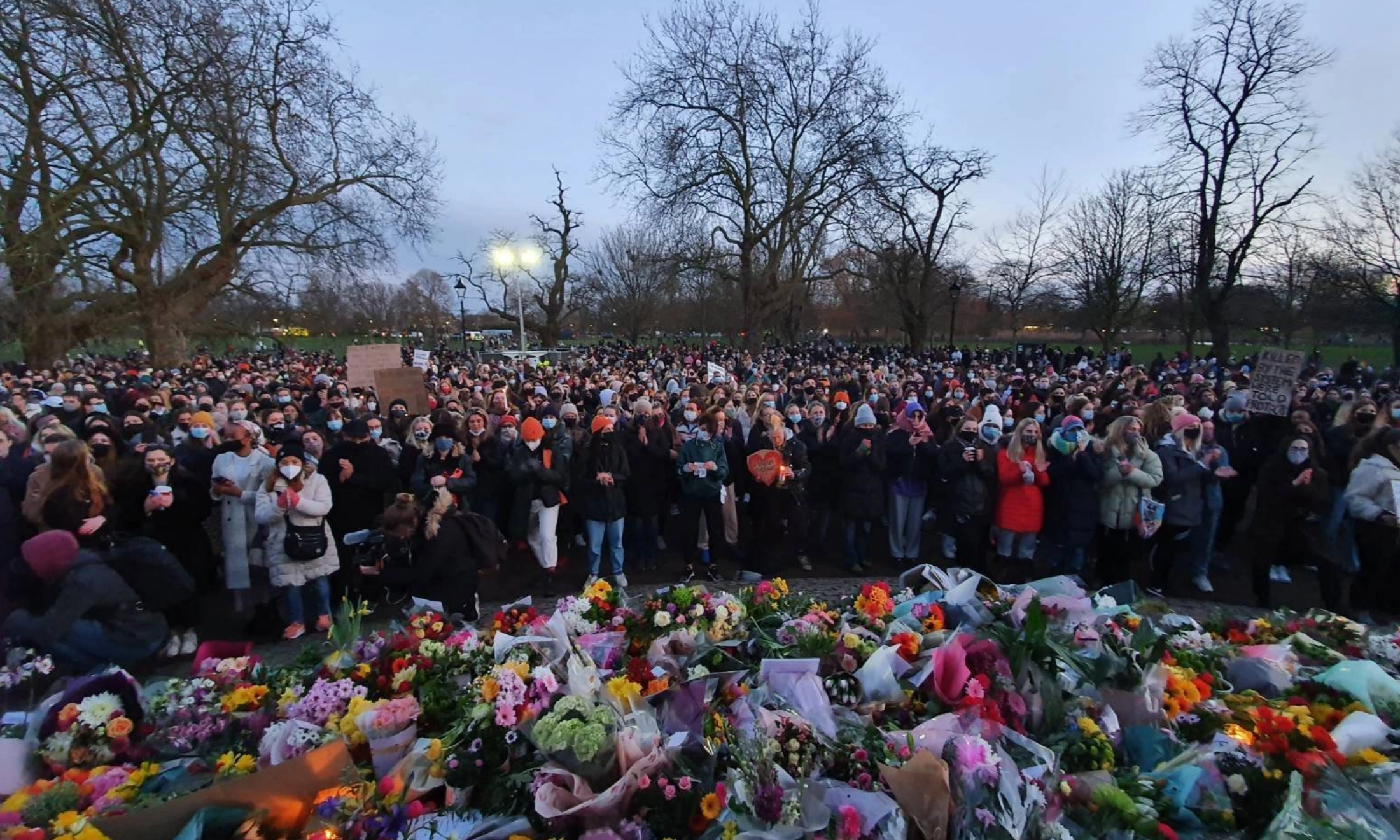
Shahed Ezyadi
How a York noise protest become the first battleground in the fight to stop ‘mega prisons’
A sunny weekend saw people descend on HMP Sutton to protest the racist treatment of prisoners – and a giant new jail proposed by Boris Johnson
Shahed Ezaydi
10 Jun 2021
Last Saturday, around 50 people descended on HMP Full Sutton, a Category A and B men’s prison that squats in a small village just outside York. Protesters stepped off buses armed with nothing but pots, pans, and an abundance of energy. They’d come from all across the UK – from London to Cardiff – to lend support and solidarity to an action protesting racist abuse and the violence prisoners of colour are subjected to, as well as a planned ‘mega prison’ at the Full Sutton site.
Undeterred by the police van and prison guards trailing closely behind the crowd as they made their way to the prison walls, protestors sounded horns, banged pots together, and set off colourful flares. People were encouraged to make as much noise as possible, so that the demonstration – organised by Community Action on Prison Expansion (CAPE) – could be heard by the prisoners within the walls. And when a protester cut through all the noise and bellowed through a megaphone ‘can you hear us?’, shouts and cheers from men within the prison were returned to a jubilant crowd.
One young woman told gal-dem she was there to combat media disinterest. “When the mainstream media constantly stays silent on situations like what’s happening in our prisons, it’s up to us to raise awareness and fight for change,” she said.
With chants of “we don’t need no HMP, we just need community” and “abolish prisons now”, the message was loud and clear. Speechmakers at the protest reflected the national scale of a renewed coalition being built that ties together opposition to systemic racism and the prison industrial complex. Camilla Mngaza, mother of Siyanda, told the crowd of her daughter and how she was failed countless times by the criminal justice system because of her skin colour. Siyanda Mngaza is currently serving a four and half years prison sentence in Wales, charged with Grievous Bodily Harm. She has always maintained that she was acting in self-defence, after being set upon by a group of people in an alleged racial assault.
Siyanda’s situation echoes the stories of many within HMP Full Sutton, including the cases of Kevan Thakrar and Dwayne Fulgence. The two men formed a focal point of CAPE’s organising in the run up to the weekend’s protest, with letters from both Thakrar and Fulgence’s representatives read out during the action, expressing their gratitude for people taking a stand with them.
Thakrar has been in prison since 2008, charged under the ‘joint enterprise’ law, which allows for charges to be brought against people who may have been present at the scene of a crime, but didn’t commit the actual crime itself. Thakrar was held in a Close Supervision Centre (CSCs) – also known as ‘prison within prisons’ – for 11 years, and restricted to his cell for 23 or more hours per day. He has experienced racism and violence at the hands of both other prisoners and prison guards. And since the middle of April this year, he’s been held in a segregation cell that’s unclean and without electricity.
Fulgence, a Black Muslim man, is also being held in the segregation unit at Full Sutton. He was beaten by four white prison officers on 22 April of this year, and left with severe injuries. However, the prison denied Fulgence access to medical treatment and refused his applications to have photos taken of the injuries sustained in the attack. Thakrar and Fulgence are just two examples of the racist abuse so many people of colour face within prison. And they have to deal with racist violence both on an individual level and on an institutional level.
“CAPE’s organisation stretches beyond opposing the present racist violence at HMP Sutton though. Saturday’s protest also targeted plans for a proposed ‘mega prison’ at the site”
“People of colour, particularly Black people and Muslims, are more likely to have their cases go to trial, be given custodial sentences, and have those sentences be longer and more severe,” explains one of the CAPE organisers.
“Once people enter the system as prisoners, they then also have to contend with prison officers attempting to extend their sentences, physical violence, and the refusal of medication or psychological support,” they add.
CAPE’s organisation stretches beyond opposing the present racist violence at HMP Sutton though. Saturday’s protest also targeted plans for a proposed ‘mega prison’ at the site. A key 2019 Tory pledge was the creation of 10,000 new prison places, and the 1440-bed prison at the Full Sutton site will be the first step in the government’s prison expansion project. The institution, which will be a Category C resettlement prison, was approved in September 2019 and is due to open in 2024.
This large scale prison expansion project, coupled with the pending Policing, Crime, Sentencing and Courts Bill, will very likely have a disproportionate effect on people of colour, say CAPE. CAPE explains that the Policing Bill will set the groundwork for the expansion and building of these new mega prisons, and these prisons are then going to need filling. And that’s when the state will target poor and marginalised people to occupy these prisons because “it’s an easy way for the state to extend their control and dispose of people, rather than deal with the social issues behind crime.”
The building of a mega prison, and therefore expansion of the prison industry complex, is not the state prioritising public safety, but prioritising control and profit.
“The Ministry of Justice has a vested interest in the carceral state, awarding contracts to private companies and profiting from exploitative prisoner labour, whilst community services remain underfunded,” a representative from Sisters Uncut Leeds tells me.
They add that prisons only expose people to more violence, exacerbating rather than healing any harms done, further proving that prisons are not institutions built for ‘solving’ the problem of crime.
“Demonstrations like this one are all about standing in solidarity with the people within the prison walls, because even if you put prisons in the middle of the countryside where it’s assumed people will forget about them, people will still show up,” says CAPE. Saturday’s action won’t be the last of its kind. It’s clear there’s a real fight ahead.
“When we talk about standing in solidarity with marginalised communities, that should mean all marginalised people, including those who are incarcerated and have had their voice silenced by the state,” one protester told gal-dem when asked why they’d made the trip to York. “Solidarity means liberation for all.”

Britain’s policing was built on racism. Abolition is unavoidable

How Pakistan’s Khwaja Sira and transgender communities are fearing and fighting for their futures

Their anti-rape performance went viral globally. Now what?






